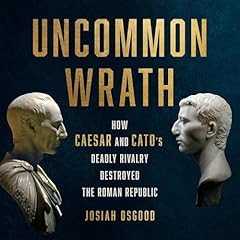
Mortal Republic
How Rome Fell into Tyranny
No se pudo agregar al carrito
Solo puedes tener X títulos en el carrito para realizar el pago.
Add to Cart failed.
Por favor prueba de nuevo más tarde
Error al Agregar a Lista de Deseos.
Por favor prueba de nuevo más tarde
Error al eliminar de la lista de deseos.
Por favor prueba de nuevo más tarde
Error al añadir a tu biblioteca
Por favor intenta de nuevo
Error al seguir el podcast
Intenta nuevamente
Error al dejar de seguir el podcast
Intenta nuevamente
 Exclusivo para miembros Prime: ¿Nuevo en Audible? Obtén 2 audiolibros gratis con tu prueba.
Exclusivo para miembros Prime: ¿Nuevo en Audible? Obtén 2 audiolibros gratis con tu prueba.
Elige 1 audiolibro al mes de nuestra inigualable colección.
Acceso ilimitado a nuestro catálogo de más de 150,000 audiolibros y podcasts.
Accede a ofertas y descuentos exclusivos.
Premium Plus se renueva automáticamente por $14.95 al mes después de 30 días. Cancela en cualquier momento.
Compra ahora por $25.19
-
Narrado por:
-
Matt Kugler
-
De:
-
Edward J. Watts
In Mortal Republic, prize-winning historian Edward J. Watts offers a new history of the fall of the Roman Republic that explains why Rome exchanged freedom for autocracy. For centuries, even as Rome grew into the Mediterranean's premier military and political power, its governing institutions, parliamentary rules, and political customs successfully fostered negotiation and compromise.
By the 130s BC, however, Rome's leaders increasingly used these same tools to cynically pursue individual gain and obstruct their opponents. As the center decayed and dysfunction grew, arguments between politicians gave way to political violence in the streets. The stage was set for destructive civil wars -- and ultimately the imperial reign of Augustus.
The death of Rome's Republic was not inevitable. In Mortal Republic, Watts shows it died because it was allowed to, from thousands of small wounds inflicted by Romans who assumed that it would last forever.
Los oyentes también disfrutaron:




















Reseñas de la Crítica
"[An] incisive history...Watts describes how the rise of an economic élite and increasing inequality brought about populist sentiment that was easily exploited by nefarious politicians. The parallels to the present day are striking."—New Yorker
"If the central analogy that animates Mortal Republic is correct, the current challenge to America's political system is likely to persist long after its present occupant has left the White House."—New York Times Book Review (Editor's Choice)
"Mortal Republic provides excellent insights into how the Republic became the Empire, and more broadly it speaks to the ever-present threat of centralized power. The more a civilization centralizes, the more powerful a central government becomes."—New York Journal of Books
"Watts chronicles the ways the republic, with a population once devoted to national service and personal honor, was torn to shreds by growing wealth inequality, partisan gridlock, political violence and pandering politicians, and argues that the people of Rome chose to let their democracy die by not protecting their political institutions, eventually turning to the perceived stability of an emperor instead of facing the continued violence of an unstable and degraded republic."—Smithsonian
"Readers will find many parallels to today's fraught political environment: the powerful influence of money in politics, a 'delegitimized establishment,' and 'the emergence of a personality-driven, populist politicking.' Watts ably and accessibly...covers a lot of ground in a manner accessible to all readers, including those with little knowledge of Roman history. This well-crafted analysis makes clear the subject matter's relevance to contemporary political conversations."—Publishers Weekly
"In a timely book of ancient history, an eminent classicist looks at Rome's decline from representative government to corrupt empire.... Given that mistrust of institutions is a key ingredient in the collapse of republican rule, as we are witnessing daily, the lesson is pointed. An engaging, accessible history that, read between the lines, offers commentary on today's events as well as those of two millennia past."—Kirkus
Las personas que vieron esto también vieron:


















Rome’ Lessons
Se ha producido un error. Vuelve a intentarlo dentro de unos minutos.
Superb hiatory of the Roman Republic
Se ha producido un error. Vuelve a intentarlo dentro de unos minutos.
I’ll read this again in about a year. Know that I’ll get more out of it on the second reading.
EXCELLENT
Se ha producido un error. Vuelve a intentarlo dentro de unos minutos.
Achingly relevant
Se ha producido un error. Vuelve a intentarlo dentro de unos minutos.
It was written with at least one eye on recent (geo)political events/attitudes/gestault - because words such as populism/autocracy/"reduction of political norms" abound.
Bottom Line: The history seems to indicate that over time - there was a "loosening" of the Political Norms and process models within the Roman Republic - from the time and behavior of Marius - down to Caesar, Octavian, and the others. Then, as now - it is not only "what was done" - but the "politics and political messaging/positioning" that certain representatives of certain Roman families did as they competed for power.
In the end after a series of Civil Wars - Octavian wound up "the winner" - but he constructed a governance model for a large empire - gives roles to the Senate - but he (Emperor) was the indispensable individual.
Relevant for today - not just in the United States but in other budding autocracies (Russia, China, Hungary the Philippines) - will the other branches of political power - "stand up" to autocratic instincts - if not them - the people need to act - else the institutions may give way to a budding autocracy.
Great history - with great relevance for today - should be of interest to those who study Roman history.
Carl Gallozzi
cgallozzi@comcast.net
History of the Roman Republic - relevant today
Se ha producido un error. Vuelve a intentarlo dentro de unos minutos.


